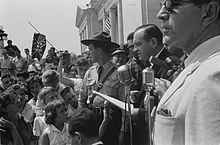Orval Faubus

Orval Eugene Faubus (born January 7, 1910 in Huntsville , Arkansas , † December 14, 1994 in Conway , Arkansas) was an American politician . From 1955 to 1967 he was governor of the US state of Arkansas for the Democratic Party .
Early years and political advancement
Politics played an important role even at a young age. His father, Sam Faubus, a poor farmer, was a member of the American Socialist Party and was temporarily detained for distributing socialist leaflets. Orval briefly attended Commonwealth College in Mena , Arkansas. In the following years he worked in various professions, e.g. B. as a farmer, lumberjack or school teacher. During the Second World War he served in the US Army and was deployed in Europe. For his military achievements he received several orders of merit. After the war was over, Faubus served on the Arkansas State Highway Commission between 1949 and 1951. 1952 to 1953 he was head of the highway administration in this state. Between 1946 and 1947 and again from 1953 to 1954 he was the head of the Huntsville Postal Services. In 1954, he beat the incumbent Governor Francis Cherry in the Democratic primary for the upcoming gubernatorial election, which he then won.
Arkansas Governor
Orval Faubus took up his new office on January 11, 1955. He should complete a total of six two-year terms and remained in office until January 10, 1967. He holds the record in office of the governors of Arkansas to this day. Although he had actually announced a liberal course, Faubus developed into a radical supporter of racial segregation and an opponent of the civil rights movement. In 1957, he mobilized the National Guard , a racially integrated high school in Little Rock should prevent ( Little Rock Nine ) . After such and similar incidents and significant unrest in the country, President Dwight D. Eisenhower intervened and placed the National Guard, as well as all police and army units of Arkansas under federal command, and also sent army units of the 101st Airborne Division to Arkansas. The introduction of the race-integrated schools could now be carried out. Faubus' policies were well received by the conservative forces in Arkansas, but at the same time they blocked a political career at the federal level. After all, Faubus had to come to terms with the political developments of his time. Although racial politics was the dominant theme in Faubus' reign, there were other notable events in Arkansas from those days. There was an industrial boom and the economy prospered. In the education sector, teachers' salaries have been increased to create an incentive for this profession. The motorway network was expanded and the health system improved. In the last few years of his tenure, he has become somewhat more moderate on the racial issue. Relations with the federal government therefore relaxed somewhat under the governments of John F. Kennedy and Lyndon B. Johnson . During his tenure, Faubus was also a member of several governors' associations.
Another résumé
In 1966 Faubus renounced a seventh consecutive candidacy. In 1970, 1974, and 1986, he ran again unsuccessfully for a return to the office of governor of Arkansas. In 1986 he lost to future President Bill Clinton in the primary elections . Between 1981 and 1983 Faubus was the head of the scandal-ridden Arkansas State War Veterans Department.
Private life
After 38 years of marriage, his marriage to Celia Alta Haskins was divorced. Their son Farrell Faubus died of a drug overdose in June 1976. In March 1983, his second wife, Elizabeth Westmoreland, died. She was found strangled in her bathtub. Her killer, David Scott Helfond, was later sentenced to life imprisonment. Orval Faubus himself died of prostate cancer in December 1994.
additional
The well-known jazz composer Charlie Mingus wrote the piece Fables of Faubus - a political protest song against the racist politician. The Calypso artist Lord Invader criticized Faubus' policy in his song Crisis in Arkansas .
Web links
- Orval Faubus in the National Governor Association (English)
- Online biography of Governors of Arkansas (English)
- Online biography in Arkansas Encyclopedia (English)
- Orval Faubus in the database of Find a Grave (English)
Individual evidence
- ↑ Freyer, Tony A. "Politics and Law in the Little Rock Crisis, 1954-1957," Arkansas Historical Quarterly 2007 66 (2), pp. 145-166.
- ^ Reed, Roy. "Faubus: the Life and Times of American Prodigal," Fayetteville: University of Arkansas Press 1997, p. 343.
| personal data | |
|---|---|
| SURNAME | Faubus, Orval |
| ALTERNATIVE NAMES | Faubus, Orval Eugene (full name) |
| BRIEF DESCRIPTION | American politician |
| DATE OF BIRTH | January 7, 1910 |
| PLACE OF BIRTH | Huntsville , Arkansas |
| DATE OF DEATH | December 14, 1994 |
| Place of death | Conway , Arkansas |
